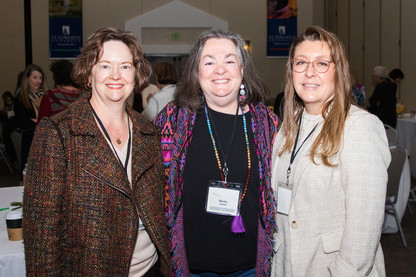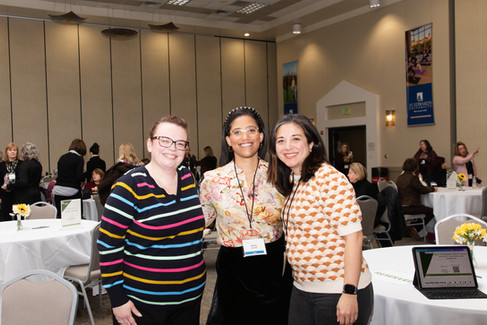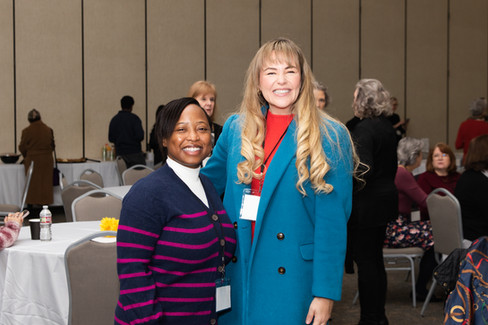Key Takeaways and Inspirations from Discovery Day 2025
- Impact Austin
- Jan 30
- 5 min read
Cold temperatures didn't dampen our enthusiasm for Impact Austin's signature day of learning. Board Vice President Claudia Barlow welcomed our diverse attendees: Impact Austin members, their guests, Community Partner grantees, and other nonprofit representatives. We thank these sponsors whose underwriting helped us create the event: Insights4Equity LLC, Polaris Executive Talent Advisors, and C2C Media.

Keynote Presentation
Sierra Randall - Partner and Development Strategy, Insights4Equity
Sierra Randall is passionate about fostering authentic connections between nonprofits and philanthropic communities. Her Discovery Day presentation about trust-based philanthropy and community-centric fundraising emphasized funding relationships that are collaborative rather than transactional.
Trust-based philanthropy (TBP) is a growing practice within giving circles like Impact Austin. We have been learning about it from multiple sources, including the Trust Based Philanthropy Project, since 2020. At its heart, TBP is about being more trusting of, and in collaboration with, community nonprofits. Community-Centric Fundraising's 10 Principles are a framework to help nonprofits lean into TBP and away from traditional funding power dynamics. As funders, collectively and individually, Impact Austin members can consider how we can foster collaborative relationships with our Community Partners.
Fundraising must be grounded in equity and social justice - Encourage donors to reflect on the impact of economic inequity in their community. Invest in fundraisers from the communities served. Avoid practices that funnel most funding to large organizations.
Collective community over individual mission - Focus on the larger ecosystem, not just individual goals. Avoid practices that harm the sector to benefit your organization.
Mutual support among nonprofits - Treat other nonprofits as partners, not competitors. Collaborate with aligned organizations to build comprehensive cases for support. Share donors, grants, resources with other agencies. Publicly recognize and credit other nonprofits for their contributions to the community.
Value all contributors equally - Appreciate staff, board members, volunteers, community supporters, and those served as much as donors. Recognize clients as contributors and collaborators, not just beneficiaries of services. Prioritize investing in growth and fair compensation for staff and volunteers.
Time is as valuable as money - Appreciate supporters' time contributions equally to financial ones, especially from marginalized/under-resourced/under-estimated communities. Acknowledge extra or unpaid hours by board and staff to increase motivation and prevent burnout.
Treat donors as partners - Respect donor integrity, assume best intentions, be willing to have difficult conversations, and push back when necessary. Be transparent about the resources required to maintain donor relationships.
Foster a sense of belonging in fundraising, among those served and within the larger community of support - Avoid extracting from the people served; be thoughtful about images and language to prevent reinforcing harmful stereotypes. Involve the community authentically with transparent and meaningful engagement and accessible ways to give beyond financially.
We all benefit from this work - Everyone (donors, staff, funders, board members, volunteers) personally benefits from engaging in the work of social justice. It's not just charity and compassion. Highlight how strengthening the community benefits both donors and those they support.
We see the work of social justice as holistic and transformative, not just transactional.
Strong communities require a commitment to economic justice - Nonprofits need to be able to say that wealth disparities exist. Encourage fundraisers and donors to reflect on how they can avoid perpetuating systems of wealth disparity.

Table Discussions
Board member Kiyomi Beach facilitated table discussions that followed the presentation, and attendees discussed these questions:
Which values or principles from the keynote resonated with you and why? Some comments: protect a nonprofit's/Executive Director's resources; look at the big picture - the community; frame total community value for donors; grant reviewers from the community affected; the "overhead myth"; how to convey impact of overhead, of unrestricted grants; undervaluing volunteers; undervaluing female staff; the value of nonprofits collaborating; what is the reality of getting nonprofits to collaborate?
Austin Together facilitates collaborations.
2025 Collaborative Community Summit - April 24, 2025. Registration opens mid-February.
How can we increase Impact Austin's Community and Inclusivity?
Women entrepreneurs; find young volunteers; what skills are we looking for? Create simple talking points (elevator speech) that existing members can "pitch" IA. Pay money to show up in some spaces, like Women Lawyers. Go into communities of color and nourish those relationships. Lean into the nonprofit community. Tour nonprofits. Consider college students, "the broke crowd."
What is one step Impact Austin can take immediately to better align with Trust Based Philanthropy and Community Centric Fundraising?
Feedback from unsuccessful grant applications would encourage re-application. Simplify the applications; build equity into the process. Numerical evaluation system.
"Showing up" - hear directly from new audiences, nonprofits.
Get the message out about unrestricted dollars.
Member Panel

Kalí Rourke - Founding Board President, Seedling Mentors
Brittany Sharkey - Executive Director, TX Board of Veterinary Medical Examiners
Marissa Yates - Social Media Strategist, Consumer Reports
Moderator: Ami Kane - Executive Director, Girls Empowerment Network
Each member named various nonprofits with which she has been affiliated and the roles she's had within Impact Austin. Ami summed up the panel as, "lots of hats: that's the average Impact Austin member for you!"
How have you been a beneficiary of philanthropy? Kalí was on the GRC that gave AGE of Central Texas its first grant. As her aging mother needed their services, AGE connected her to hospice care and two organizations that provided direct service.
Marissa provides social media strategy to Consumer Reports and their advocacy department, which worked for years in banning red dye #3.
Brittany benefited from Young Women's Alliance training, which emboldened her to apply for the position she now has.
Ami noted "when we access services, it makes nonprofits deeply personal."
What challenges, especially regarding transparency, have you experienced in your nonprofit work?
Ami - Girls Empowerment Network will not apply to Impact Austin for a grant while she is on our Board of Directors. This is a fiscal challenge for GEN.
Marissa - When she was on the board for Covenant House International, she was advised to exclude details about their populations served. Ultimately, this was a disservice to the nonprofit, to the clients, and to donors. Once they were more transparent on social media, they grew the money they raised on those platforms. "Say the hard things to donors."
Kalí talked about the "blind eye" to children of parental incarceration and the fact that they are "undercover."
Brittany discussed the challenge of Young Women's Alliance's funding structure. As they made changes there, they had to message those appropriately.
Has your Impact Austin membership experience informed some other aspect of your life or work?
Kalí - GRC service means you learn!
Marissa values the transparency of Trust Based Philanthropy
Brittany - Annual Meeting was a powerful moment, hearing from grant finalists, awareness of broader community needs.
Ami commented about the broad community view, which resonates with Community-Centric Fundraising.
Quotable takeaways from Discovery Day 2025
Absolutely anyone can be a philanthropist. Anyone can give back to their community.
I really wanted to give back to my community because I knew how much my community meant to me. I've never cried at a piece of data, but show me a video of someone getting a grant.....
Keep telling the stories.
Giving is a skill. Practice. It's a muscle. Keep it strong.
It's about relationships.
Investing where you live
We all benefit from this work.
Community is the best antidote to fear.
Thank you to event photographer Marissa Yates with back up images from Alexis Borgas



























